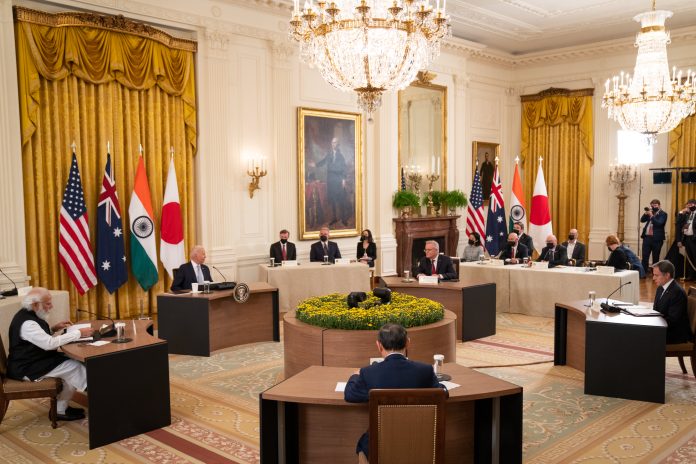On Saturday, the leaders of Australia, India, Japan and the US held a meeting in the context of the Indo-Pacific summit and announced plans for new initiatives on Indian Ocean security and paid attention to health and climate issues.
US President Joe Biden welcomed Australian Prime Minister Anthony Albanese, Indian Prime Minister Narendra Modi and Japanese Prime Minister Fumio Kishida to the Quad. Biden, at his farewell summit, wished to emphasise the importance of preserving the Quad, which he sees as a milestone foreign policy achievement. Ahead of the meeting, officials said the leaders would step up efforts to provide critical and secure technologies, including a new open radio access network, to the Pacific Islands and Southeast Asia, regions of intense competition with China, Washington’s main strategic rival.
First topic of discussion is China
Biden said: “We believe Xi Jinping is looking to focus on domestic economic challenges and minimise the turbulence in China diplomatic relationships. And he’s also looking to buy himself some diplomatic space, in my view, to aggressively pursue China’s interest.”
China continues to behave aggressively, testing us all across the region. It is true in the South China Sea, the East China Sea, South China, South Asia and the Taiwan Strait. It’s true across the scope of our relationship, including on economic and technology issues. At the same time, we believe intense competition requires intense diplomacy, he said.
“We’ve secured some gains in US-China about bilateral relations that are important,” Biden said, adding that a phone conversation with Chinese President Xi Jinping earlier this year, as well as National Security Adviser Jake Sullivan’s visit to China this summer, show the important engagement between the two countries. “We see this engagement as important for conflict prevention and crisis management amidst our strategic competition.”
Health, climate, security
Apart from security issues, the leaders also launched several joint initiatives centred around the Quad Cancer Moonshot, an effort to collaborate and save lives from cancer in the region. Initially, it will focus on cervical cancer.
They went on to reveal a plan for joint Coast Guard operations, with Australian, Japanese and Indian personnel spending time on a US Coast Guard vessel. The countries also announced plans to expand military logistics co-operation. In addition, the four countries’ Coast Guards will begin an observer programme next year to improve interoperability and maritime security, the statement said.
Co-operation on climate and clean energy, including financing for solar power projects and supply chain diversification was also in the spotlight. They are also going to deepen funding for joint research on using artificial intelligence and robotics to boost agriculture.
The hosting of the Quad by Biden comes as part of efforts to institutionalise the body ahead of his departure from office, as well as the departure of Kishida, who is stepping down after next week’s leadership contest, and next year’s Australian election .
The Quad met at the foreign minister level under the previous administration of Donald Trump, who ran in November to rival Vice President Kamala Harris, and enjoyed bipartisan support, as evidenced by the formation of the Congressional Quad Caucus before the summit, according to officials.
“It [the Quad] will survive way beyond November – way beyond November,” Biden told reporters. Albanese said he was “absolutely confident” the Quad would endure. “All four nations are committed to the Quad,” he told reporters.
